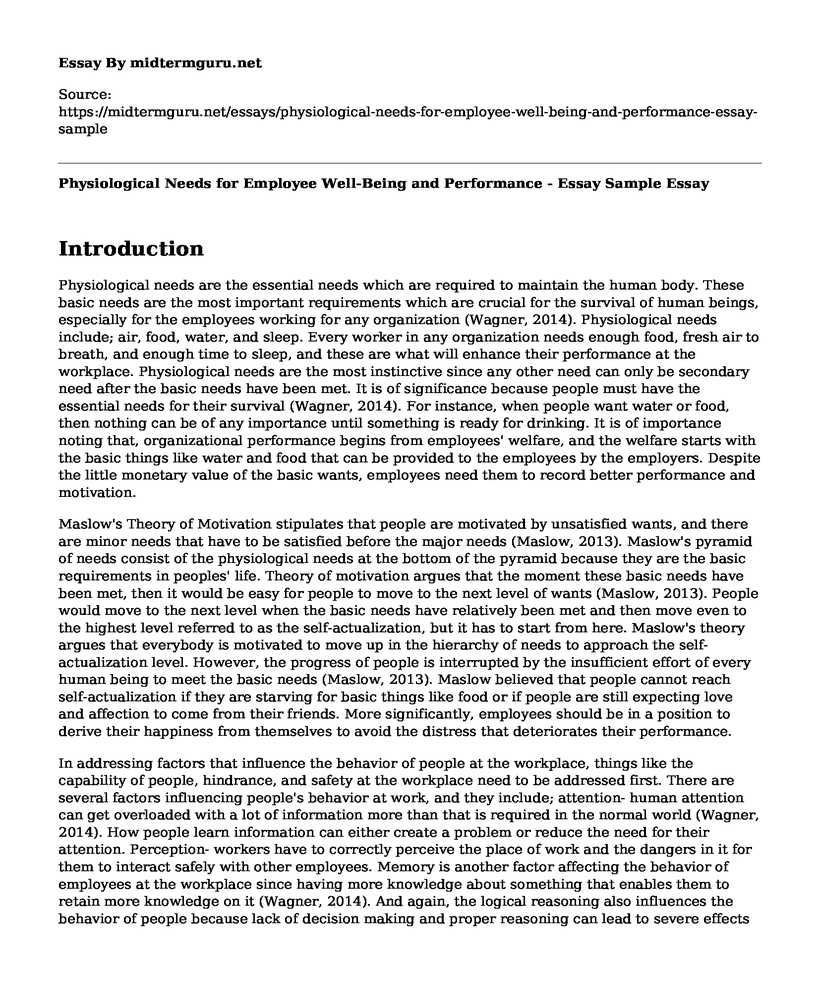Introduction
Physiological needs are the essential needs which are required to maintain the human body. These basic needs are the most important requirements which are crucial for the survival of human beings, especially for the employees working for any organization (Wagner, 2014). Physiological needs include; air, food, water, and sleep. Every worker in any organization needs enough food, fresh air to breath, and enough time to sleep, and these are what will enhance their performance at the workplace. Physiological needs are the most instinctive since any other need can only be secondary need after the basic needs have been met. It is of significance because people must have the essential needs for their survival (Wagner, 2014). For instance, when people want water or food, then nothing can be of any importance until something is ready for drinking. It is of importance noting that, organizational performance begins from employees' welfare, and the welfare starts with the basic things like water and food that can be provided to the employees by the employers. Despite the little monetary value of the basic wants, employees need them to record better performance and motivation.
Maslow's Theory of Motivation stipulates that people are motivated by unsatisfied wants, and there are minor needs that have to be satisfied before the major needs (Maslow, 2013). Maslow's pyramid of needs consist of the physiological needs at the bottom of the pyramid because they are the basic requirements in peoples' life. Theory of motivation argues that the moment these basic needs have been met, then it would be easy for people to move to the next level of wants (Maslow, 2013). People would move to the next level when the basic needs have relatively been met and then move even to the highest level referred to as the self-actualization, but it has to start from here. Maslow's theory argues that everybody is motivated to move up in the hierarchy of needs to approach the self-actualization level. However, the progress of people is interrupted by the insufficient effort of every human being to meet the basic needs (Maslow, 2013). Maslow believed that people cannot reach self-actualization if they are starving for basic things like food or if people are still expecting love and affection to come from their friends. More significantly, employees should be in a position to derive their happiness from themselves to avoid the distress that deteriorates their performance.
In addressing factors that influence the behavior of people at the workplace, things like the capability of people, hindrance, and safety at the workplace need to be addressed first. There are several factors influencing people's behavior at work, and they include; attention- human attention can get overloaded with a lot of information more than that is required in the normal world (Wagner, 2014). How people learn information can either create a problem or reduce the need for their attention. Perception- workers have to correctly perceive the place of work and the dangers in it for them to interact safely with other employees. Memory is another factor affecting the behavior of employees at the workplace since having more knowledge about something that enables them to retain more knowledge on it (Wagner, 2014). And again, the logical reasoning also influences the behavior of people because lack of decision making and proper reasoning can lead to severe effects in complex activities. Competence- workers also should be challenged, leading to great performance. Relatedness is another factor since employees need to be cared for by the employers. Finally, autonomy since people should have their choices and can determine on their own (Wagner, 2014). It is worth noting that many organizations have been affected negatively because most of the physiological needs are not met by the employees; hence, deteriorating their performance and reduced productivity in at work. Organizations should ensure basic needs are given to the workers and that their welfare is properly addressed by the bosses.
References
Maslow, A. H. (2013). A theory of human motivation. Simon and Schuster.
Wagner, H. (2014). The psychobiology of human motivation. Routledge.
Cite this page
Physiological Needs for Employee Well-Being and Performance - Essay Sample. (2023, Jan 20). Retrieved from https://midtermguru.com/essays/physiological-needs-for-employee-well-being-and-performance-essay-sample
If you are the original author of this essay and no longer wish to have it published on the midtermguru.com website, please click below to request its removal:
- Analysis of Apple Inc Company - Paper Example
- Work Environment Presented by Deloitte Company - Management Paper Example
- Essay Sample on Physical Intervention Program Among Sedentary Workers
- Personality Across a Lifespan - Essay Sample
- Analysis of Cross-Cultural Leadership Practices - Essay Sample
- Leadership From Jesus Christ: A Christian Perspective - Essay Sample
- Moral Philosophy: Examining Right and Wrong in Existence - Essay Sample







